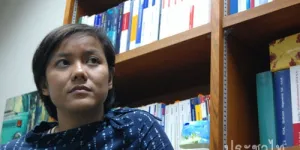By Sorawut Wongsaranon, Yiamyut Sutthichaya |
<p>An escalation of symbolic actions by pro-democracy protesters took place after the repeated use of force against protesters by the police and legal charges against its leading figures. But when it comes to burning portraits of the King, the state uses the royal defamation law to handle the problem.</p>
By Prachatai |
<p>To protect the monarchy, the head of an ultra-royalist group has made an announcement asking volunteers to infiltrate protests and take pictures of participants in order to create a blacklist of individuals that Thai society must ban. </p>
By Prachatai |
<p>On 8 February, after the Thai Raksa Chart Party nominated former princess Ubolratana Mahidol as their candidate for Prime Minister, a Royal Command was issued stating that members of the royal family must be above politics. Prachatai spoke to Sawatree Suksri, lecturer at the Faculty of Law, Thammasat University, on the status of the Royal Command and its interpretation. </p>
<p dir="ltr">Authorities withhold bail from lèse-majesté suspects to force false confessions and promote fear, a renowned law expert has argued. In Thailand, the right to bail has been transformed into a tool of intimidation.</p>
<p></p>
By Metta Wongwat |
<div>The Thai word “ja” has become popular in Thailand as a criticism of the police, following the arrest of an activist’s mother in early May on a lèse majesté charge. The case against her is seen as politically motivated and has sent Thailand’s human rights record to a new low. No evidence has been unveiled to the public other than the word “ja,” non-committal, colloquial ‘yes’ Thai, she said during a Facebook conversation. Assistant Professor Sawatree Suksri, expert on criminal law from Thammasat University, and core member of Nitirat, explained whether this could really deemed lèse majesté. </div>
<div>
</div>
By Thaweeporn Kummetha |
<div>Ubon Ratchathani Court in the northeastern province in July gave an unprecedented sentence of 30 years in jail to a musician for defaming the king.
</div>
<div> </div>
<div>
<div>Thai police on Wednesday charged Worachet Pakeerut, a law academic from Thammasat University and member of the courageous Nitirat group, for not reporting to the junta -- on time. </div>
<div> </div>
<div>He was released from Bangkok Remand Prison at about 6.30 pm on Wednesday.</div>
<div> </div>
<div>Worachet flew back from Hong Kong to Don Muang International Airport in Bangkok on Monday. The Immigration Police detained him and took him to the Army Club in Theves, Bangkok.
</div></div>
<p>The military has released Sawatree Suksri, law academic from Thammasat University and member of Nitirat group, from detention around 10pm of Monday. </p>
<p>The military escorted her home after a full-day interogation at the Army Club at Thevet since Monday morning. She was detained at a military camp in eastern Prachinburi province for two nights.</p>
<p>The military did not press any charge against her, according to a source. </p>
By Suluck Lamubol |
<p>Academics from the Nitirat (Enlightened Jurists) group and well-known scholars are calling for whole scale reform of the courts, from legal texts to ideologies, to achieve a judicial system more in line with democracy. </p>
<p></p>
<p>The Ministry of Information and Communications Technology has blocked a <a href="http://www.enlightened-jurists.com/directory/84/Statement-of-Thai-Revolutionary.html">page</a> of the Nitirat website which published the first declaration of the People’s Party after the overthrow of the Absolute Monarchy in 1932.</p>
By Mutita Chuachang, Athit Suriyawongkul |
<p>Sawatree Suksri, a lecturer of the Faculty of Law, Thammasat University, who has studied computer-related law in Germany, talked to Prachatai about the 2007 Computer Crimes Act which she finds too ambiguous in many points, including, for example, national security, which has been subject to arbitrary interpretations by the authorities.</p>



